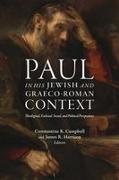Ulteriori informazioni
As a Pharisee who had risen to prominence among his Jewish contemporaries, the apostle Paul emerged from the cradle of Second Temple Judaism to become, by God's calling, Christ's apostle to the Gentiles. That the apostle was intimately familiar with both worlds, Jewish and Graeco-Roman, has often been overlooked by New Testament scholars, who have tended to gravitate either to one background or the other in explaining the legacy of the apostle in the Western intellectual tradition or in writing commentaries on his epistles. Happily, recent scholarship has begun to shift toward an acceptance that Paul was a Jew of the Second Temple period and a diaspora intellectual who negotiated the various challenges of Graeco-Roman cities and cultures. This results in historically thicker exegesis with biblical theology, social history, and classical studies being drawn on to recognise the rich tapestry of influences that gave shape to Paul's person and legacy.
Edited by Constantine R. Campbell and James R. Harrison, the essays in this volume track closely with current trajectories within Pauline scholarship on the themes of social history and kinship, Judaism and the eschatology of identity markers, Graeco-Roman moral and/ or political culture, empire and salvation history, temple and messianism, prophecy, rhetoric, and community boundaries, and chronology and historical reconstruction. Together these essays offer creative approaches, fresh insights, and novel possibilities. As such, this book contributes to the burgeoning literature exploring the apostle Paul, his mind, his message, and his legacy.

